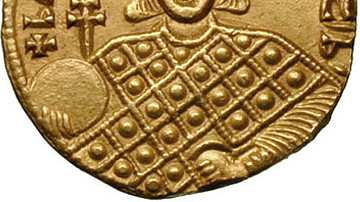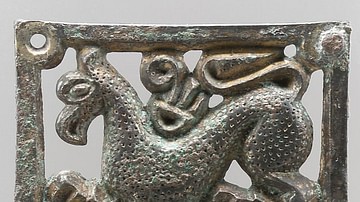Search
Did you mean: Galatia?
Search Results

Definition
Avars
The Avars were a confederation of heterogeneous (diverse or varied) people consisting of Rouran, Hephthalites, and Turkic-Oghuric races who migrated to the region of the Pontic Grass Steppe (an area corresponding to modern-day Ukraine, Russia...

Definition
Alexios I Komnenos
Alexios I Komnenos (Alexius Comnenus) was emperor of the Byzantine Empire from 1081 to 1118 CE. Regarded as one of the great Byzantine rulers, Alexios defeated the Normans, the Pechenegs, and, with the help of the First Crusaders, the Seljuks...

Definition
Emperor Zeno
Zeno was Byzantine emperor from 474 until 491 CE. An ethnic Isaurian, Zeno was repeatedly criticized as an outsider during his reign, which was full of rebellions and attacks by the Ostrogoths. He is best known for his failed attempt to compromise...

Definition
German Crusade 1197-8 CE
The German Crusade of 1197 CE, also known as the 'Emperor's Crusade', was led by the Holy Roman Emperor Henry VI (r. 1191-1197 CE). Although the emperor died on his way east, his army did capture Beirut from the forces of the Ayyubid dynasty...

Definition
Basil I
Basil I was emperor of the Byzantine Empire from 867 to 886 CE and he founded the "Macedonian" dynasty which lasted for over 200 years. Basil was an Armenian from a humble background who had risen to become the second most powerful man in...

Definition
Bayan I
Bayan I (reigned 562/565-602 CE) was a king of the Avars, a confederation of heterogeneous people who migrated from the region of Mongolia, north of China, in 552 CE and came in contact with the Eastern Roman Empire c. 557 CE. Bayan I is...

Article
Medieval Knights: 12 of the Best
The knights of medieval Europe were meant to be the finest fighting men of their age, even more important, they were expected to be pure in thought and deed, as exemplified in the chivalrous code which they (usually) followed. Here are the...

Article
Battle of Wagram
The Battle of Wagram (5-6 July 1809) was one of the largest and bloodiest battles of the Napoleonic Wars (1803-1815). It resulted in a pyrrhic victory for French Emperor Napoleon I (r. 1804-1814; 1815) whose army crossed the Danube River...

Image
Roman Empire in 117 CE
Map of the Roman Empire at its maximum extent in 117 CE, under the rule of Trajan.

Image
Amphitheatre, Salona
The remains of the amphitheatre of Salona (Solin, Croatia), erected in the latter half of the 2nd century (c. 170 CE). The fights in the arena could be watched by some 17,000 spectators.